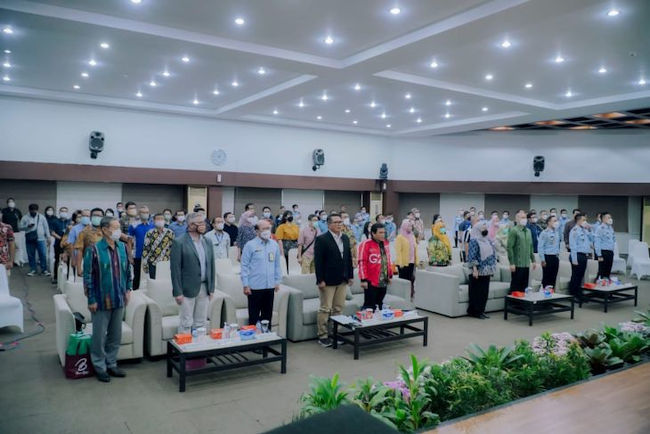The Directorate General of Immigration and PT Surabaya Industrial Estate Rungkut (SIER) Surabaya, East Java, Indonesia, held a coaching clinic to provide information on second-home visas to foreign investors and consul generals from several countries this week.

The participants of the Coaching Clinic on Immigration Services and Second-Home Visa Assistance, which was held in Surabaya on Thursday (November 3, 2022), included British Prosperity Honorary Consul for Surabaya and East Java Ivy Kamadjaja; Honorary Consul of the Federal Republic of Germany Christopher Tjokrosetio; Honorary Consul of Australia Anthony Clark; and Consul General of Japan in Surabaya Takeyama Kenichi.
The coaching clinic aimed to make it easier for foreign businesses to understand the immigration service reform initiated by the Indonesian government, acting director general of immigration at the Ministry of Law and Human Rights, Widodo Ekatjahjana, said in a statement issued on Friday.
SIER, which was the first industrial area in Indonesia used by the Directorate General of Immigration as a venue for the coaching clinic, has many tenants and investors from abroad who require easy, fast, and friendly immigration services.
So, we met directly with foreign investors in this industrial area of SIER. Through this coaching clinic, we are trying to bring services closer. If there are complaints, we provide immediate solutions,” Ekatjahjana informed.
He said that he wants the immigration service reform to cover not only administrative matters, but also have an impact on the convenience and ease of investment, which, in the end, could create more jobs.
Through the second-home visa policy, which aims to attract investment in the country, foreign investors who put their money and create jobs will be able to stay longer in Indonesia.
According to Ekatjahjana, the targets of the second-home visa are certain foreigners or ex-citizens who want to stay and contribute positively to the Indonesian economy.
The visa will allow foreigners to stay in the country for five to 10 years and carry out various activities, such as investment and tourism.
“Submitting an application is very easy through a website-based application visa-online.imigrasi.go.id. There are several document requirements that must be submitted if you want to get this second-home visa,” he informed.
The documentary requirements include a national passport that is valid for a minimum of 36 months, proof of funds in the form of an account belonging to a foreigner or guarantor with a value of at least Rp2 billion or equivalent, recent color photographs, and a curriculum vitae.
The non-tax state revenue rate (PNBP) for second-home visas is Rp3 million, in accordance with the provisions in the Minister of Finance’s Regulation No. 2 of 2022.
Payments for second-home visas can be made outside the territory of Indonesia through the available PNBP payment portals.
“This policy will be effective 60 days after the circular letter was issued, namely on October 25, 2022. This immigration policy is one of the non-fiscal incentives that can be a stimulus for certain foreigners to stay and contribute positively to the Indonesian economy in the midst of global economic conditions that are challenging (and) more dynamic,” Ekatjahjana said.
Meanwhile, the president director of PT SIER, Didik Prasetiyono, said that the Directorate General of Immigration’s innovation involving the launch of the second-home visa is a breakthrough that will provide convenience to foreign investors.
For this reason, he said he hopes that it will attract more foreign investors to invest in Indonesia, especially in the SIER Surabaya and PIER Pasuruan industrial areas.
“Next year, we will be overshadowed by a global recession that has the potential to lead to a food, energy, and financial crisis so all countries will need investment. All countries will compete to attract investment. And, it must be remembered: investors’ decisions to invest are not only based on economic value, but also factors that support comfort trying, including the matter of immigration services,” Prasetiyono highlighted.
“Of course, this policy will be welcomed by our tenants who come from abroad. SIER currently accommodates more than 200 companies. In SIER, 70 percent of them are tenants from foreign investment. Among them are from Japan, the United States, Australia, China, France, South Korea, Singapore, England, Germany, the Netherlands, and India,” he added.
Japanese Consul General Kenichi said that he is very happy with the second-home visa policy as many Japanese citizens are keen to live in Indonesia after retirement.
“This is good news that we have heard. With the second-home visa, Japanese people who have retired can stay longer in Indonesia. So far, many have lived in Bali. But I do not know the exact number. But many want to stay in Indonesia after they retire,” he added.
Written by: Abdul Hakim, Yashinta Difa, Editor: Rahmad Nasution (c) ANTARA 2022
Source article: https://en.antaranews.com/news/258597/second-home-visa-introduced-to-foreign-investors-by-immigration-sier















